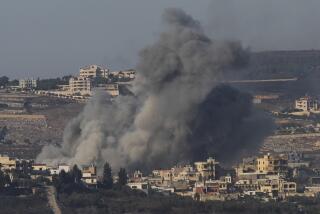Christian Sect Blocks Peace in Lebanon : Mideast: Maronite militants threaten to disrupt a tenuous accord in the battered nation; Syrian forces surround the holdout enclave.
- Share via
NICOSIA, CYPRUS — In the current Lebanon crisis there are two contradictory factors at play--a sad, old one and a new, hopeful element.
The depressing element is that, once again, as so often during the 46 years of Lebanon’s independence, the interests of Lebanon as a nation and of the Lebanese as a people are being challenged and endangered by the narrow claims of the militants in the Maronite community, and especially by a miserable succession of Maronite presidents.
As Syrian troops and armor gathered in Beirut last week, preparing for a final showdown to oust Maronite Gen. Michel Aoun from the presidential palace in suburban Baabda, most prominent among the local mediators fluttering back and forth have been patriarchs, archbishops, bishops, abbots and monks, emphasizing that this is a crisis caused by, and confined to, a single, peculiar Christian sect: the Maronites. For decades they have been fighting a rear-guard action to preserve political privileges conferred on them by France, such as the monopoly of the post of the all-powerful president of the country.
Yet, despite their lamentable record, the current claimant for the presidency, Gen. Aoun, is in opposition to all of non-Maronite Lebanon and to the world community at large because he rejects the Taif agreement reached by Lebanese deputies last month in Saudi Arabia, since it reduces the president to a constitutional head of state.
Two statistics put Lebanon’s Maronite problem in proper perspective. The Maronites constitute between 18% and 20% of Lebanon’s population, and while the total area of Lebanon is more than 10,000 square kilometers, that of Marounistan currently under Aoun’s control is between 800 and 1,000 square kilometers. In truth, much ado about not all that much, which nevertheless cripples the rest of the nation.
The record of the Maronite presidents reveals the continuous dislocation and malfunctioning of the Maronite minority within the Lebanese community. This is because the Maronites have chosen to see themselves as distinct from and alien to the West Asian Arab area. They have disliked the Arabs so much--and not just because of their Islamic faith--that they have denied being Arabs ethnically. The Maronites have developed fantastic theories that they are the descendants of the Phoenicians and, more recently, of an off-shoot of the Hittites. Maronites with any education far prefer to speak French rather than Arabic.
Because of this alienation, an essential element of Maronite politics has always been the desperate search for a foreign protector, especially “beloved mother France.” Aoun has never stopped trying to involve outside powers in his current struggle, happily without success so far. The Maronite minority psychosis is a curious combination of scorn for and a fear of “the Arab.”
In fairness to the Maronites as a whole, there are sections of the community that do not accept Aoun’s leadership or the paranoia of Aoun and his teen-age supporters. The ecclesiastical Establishment, notably the Maronite patriarch, does not (and he was beaten up by Aoun’s bully boys for his pains); the all-important business and financial community does not, because it wants peace in order to get back to making money, and even the Maronite political Establishment has parted company with Aoun. Among its members are the new president, Hrawi, and the other Maronite members of Parliament who formulated and accepted the Taif agreement which, primarily, equalizes political power between Christians and Muslims. This is the hopeful new development. From the very beginning of the civil war, the young leaders of the various militias, Christian and Muslim--not the party leaders or the civilian politicians--pursued battle and therefore directed the future course of Lebanese events. The militia leaders had a vested interest in keeping the war going, so the war went on. Then sometime during the middle of 1989 the populace and the political leaders’ decided that enough was enough, that the time had come for old-style political professionals to start negotiating. The initiative by the Arab league to find a peaceful settlement gave them their opportunity.
Despite opposition by militia leaders, both Christian and Muslim, the politicians--displaying extraordinary courage--went ahead, and in a final burst of independence and patriotism, elected not one but two presidents pledged to implement the Taif formula. The assassination of Rene Moawad seems only to have stiffened their resolve. The confrontation between the Hrawi government and Aoun is over whether there should be a return to the normal procedures of civil democratic politics and a movement away from the militia dominance.
It is because of the moral courage shown by these Lebanese politicians during the Taif process that the rest of the world and, most important, the United States and France, have upheld Taif, which means repudiating the very basis of Aoun’s anti-state rebellion.
The good guys and the bad guys are now clearly defined.
More to Read
Sign up for Essential California
The most important California stories and recommendations in your inbox every morning.
You may occasionally receive promotional content from the Los Angeles Times.










